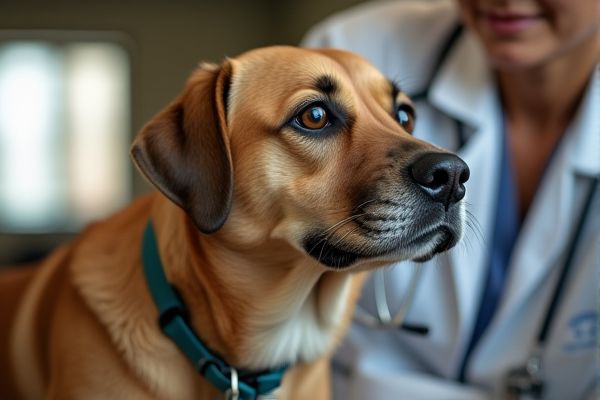
Kenya offers a variety of job opportunities in the animal health sector, reflecting the country's growing focus on livestock management and veterinary care. Positions such as veterinary technicians, animal health officers, and livestock extension officers are in demand, catering to both private practices and government initiatives. Organizations focused on animal welfare and agricultural development are actively seeking professionals with expertise in disease control, nutrition, and genetics. Networking through professional associations and attending industry conferences can enhance prospects and provide access to the latest trends and job openings.
Job Description
Animal health jobs in Kenya involve various roles aimed at improving livestock well-being and ensuring food safety. These positions may include veterinary technicians, animal health officers, and researchers specializing in disease prevention and treatment. Your responsibilities often encompass conducting health assessments, administering vaccinations, and educating farmers about proper animal care practices. The growing demand for food security and sustainable agricultural practices makes these roles essential for supporting both rural and urban communities in Kenya.
Requirement
Animal health jobs in Kenya often require a degree in veterinary medicine or animal science from a recognized institution. Experience in fieldwork and livestock management can be beneficial, as many employers value practical skills along with academic qualifications. Additionally, a deep understanding of local animal husbandry practices and health protocols can set you apart in the competitive job market. Strong communication and problem-solving skills are essential for effectively advising farmers and contributing to animal welfare initiatives across the country.
Salary and Perks Expected
Animal health jobs in Kenya typically offer a competitive salary, which can vary based on experience and specific roles within the veterinary and animal care sectors. Entry-level positions may start at around KES 40,000 to KES 60,000 per month, while experienced professionals can earn upwards of KES 100,000 or more. Perks often include health insurance, opportunities for professional development, and participation in fieldwork that contributes to wildlife conservation. As the agricultural sector continues to grow in Kenya, the demand for skilled animal health professionals is expected to rise, making it a promising career path for those interested in animal care.
Similar Job Names
- Veterinarian
- Veterinary Technician
- Animal Health Officer
- Livestock Extension Officer
- Animal Nutritionist
- Veterinary Pathologist
- Veterinary Surgeon
- Animal Welfare Officer
- Clinical Veterinarian
- Wildlife Veterinarian
- Zookeeper
- Animal Behaviorist
- Veterinary Research Scientist
- Animal Health Inspector
- Livestock Farmers' Advisor
- Parasitologist
- Animal Health Consultant
- Poultry Health Specialist
- Aquaculture Biologist
- Animal Geneticist
Job Expectation Concept
Animal health jobs in Kenya encompass a variety of roles aimed at ensuring the well-being and productivity of livestock. Veterinary professionals play a crucial role in diagnosing and treating diseases, while animal health technicians provide essential support in field operations and livestock management. The demand for skilled workers in this sector is driven by the growing importance of animal agriculture in Kenya's economy and food security. Upskilling through relevant training programs can enhance your opportunities in this dynamic field.
Career Advantage and Weakness
Animal health jobs in Kenya offer significant career advantages, including a growing demand for veterinary professionals due to the country's expanding agricultural sector. Engaging in this field provides opportunities for impact, allowing you to improve livestock health and enhance food security. A potential weakness is the challenging work conditions, which may include long hours and dealing with difficult cases in rural areas. Continuous professional development is essential to stay updated with the latest practices and technologies in animal health, ensuring your skills remain relevant in this evolving industry.
Important Thing Must Know
Animal health jobs in Kenya are vital for maintaining livestock health and productivity, given the country's reliance on agriculture and animal husbandry. Opportunities range from veterinary services to animal research, offering various pathways for specialized careers. Professionals in this field play a crucial role in disease prevention, management, and the promotion of animal welfare, benefiting both farmers and the economy. Academic qualifications in veterinary medicine, animal science, or related fields are often required to pursue these roles. Understanding local challenges, such as livestock diseases and sustainable practices, is essential for anyone looking to make a significant impact in animal health within Kenya.
Alternative Career Options
In Kenya, various alternative career options in the animal health sector extend beyond traditional veterinary roles. Opportunities exist in wildlife conservation, where you can work with organizations to preserve and protect native species and their habitats. Animal nutrition and feed formulation also present a promising avenue, aiming to improve livestock health and productivity through better dietary practices. Furthermore, roles in animal pharmaceutical sales and marketing allow for engagement with veterinarians and farmers, ensuring access to essential veterinary medicines and supplies.
Companies List
- Kenya Agricultural and Livestock Research Organization (KALRO)
- Nairobi Animal Hospital
- Kenya Veterinary Vaccines Production Institute (KEVEVAPI)
- Brookhouse Veterinary Services
- East African Wildlife Society
- Africa Animal Welfare and Humane Society
- Zoetis Kenya
- Merck Animal Health Kenya
- Unga Group
- Cargill Animal Nutrition Kenya
List of Ideal City
Nairobi stands out as a vibrant hub for animal health jobs, offering numerous opportunities in veterinary clinics, research institutions, and animal welfare organizations. Kisumu, located on the shores of Lake Victoria, has a growing need for animal health professionals due to its expanding agricultural sector, particularly in aquaculture. Nakuru, known for its agricultural activities, requires skilled practitioners for livestock management and veterinary services to support local farmers. Mombasa also presents prospects in animal health, driven by its commercial activity, including ports that facilitate the import/export of livestock and related products.
 jobs-kenya.com
jobs-kenya.com